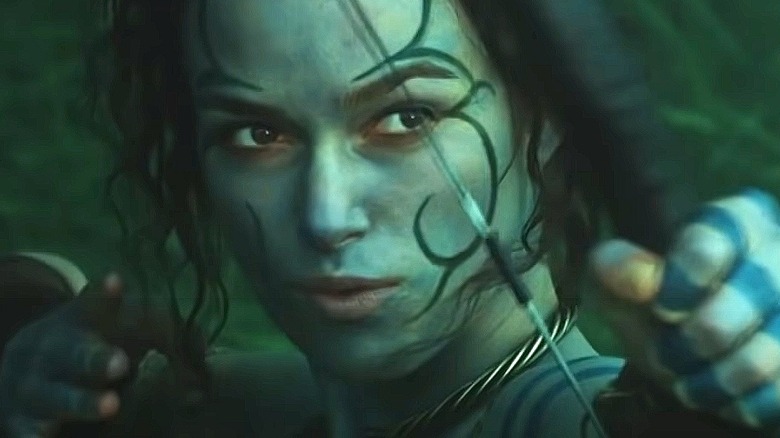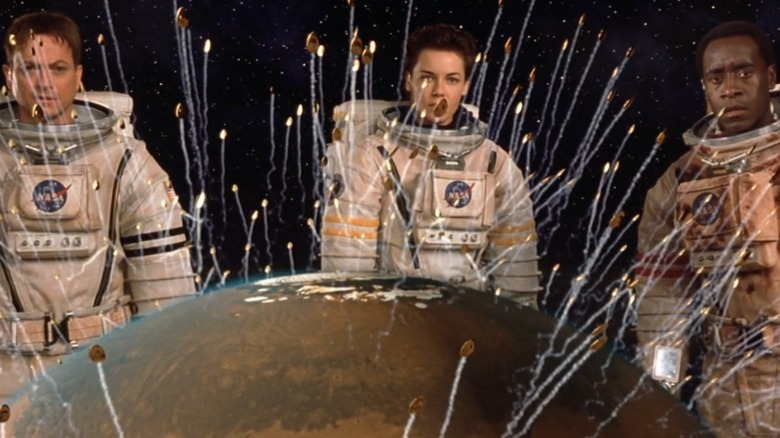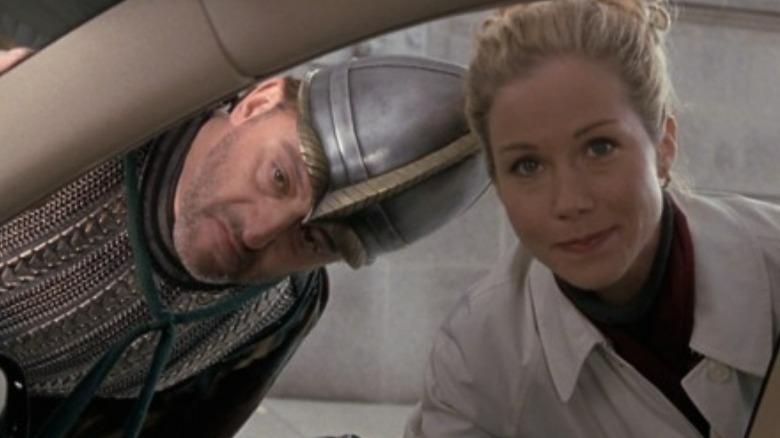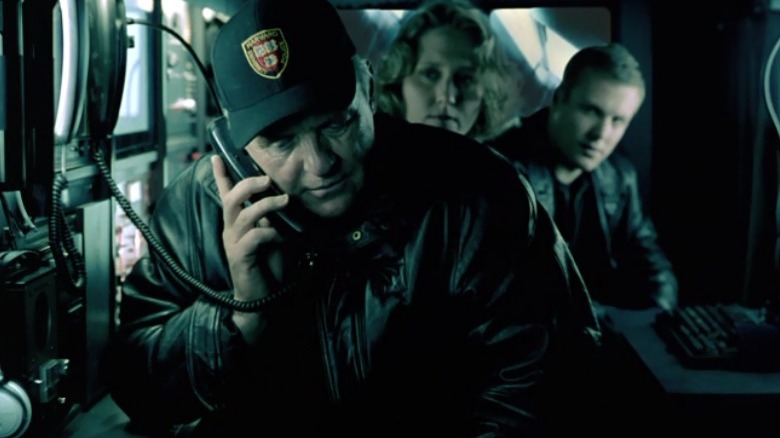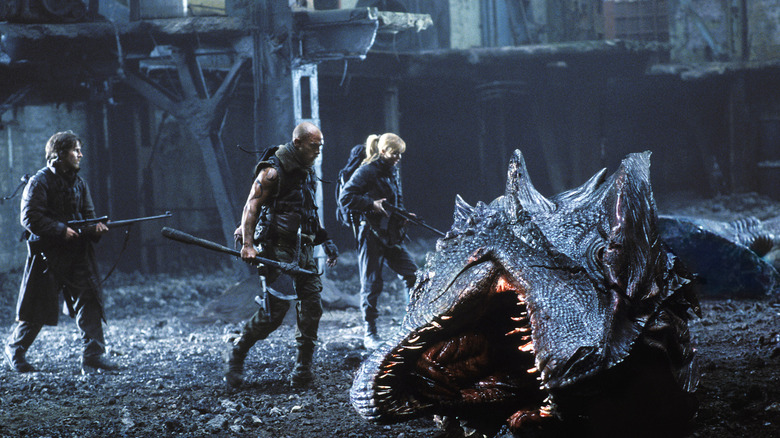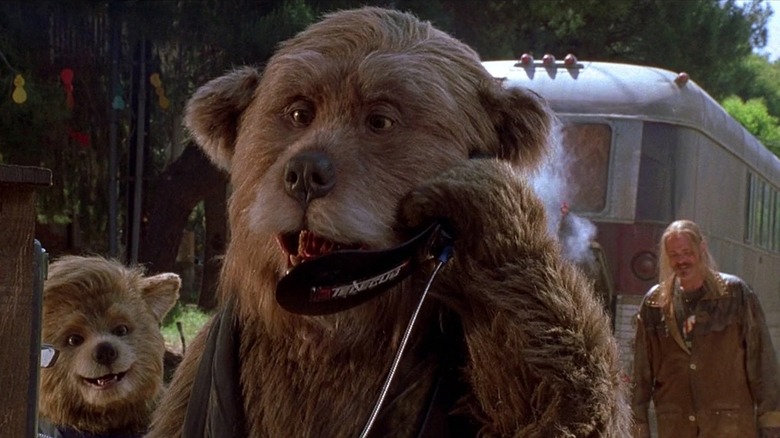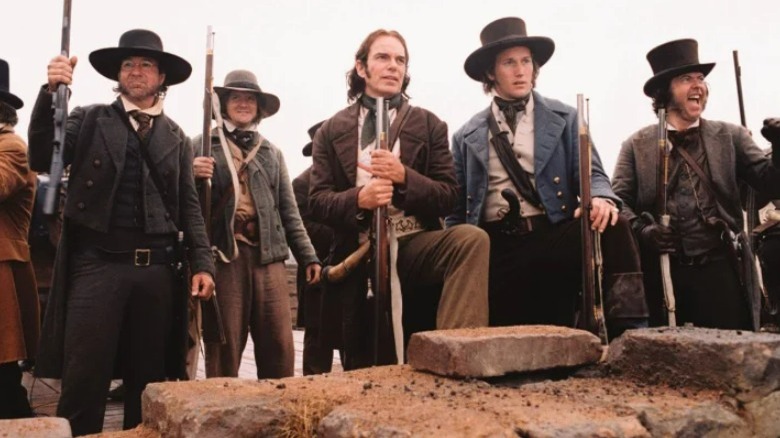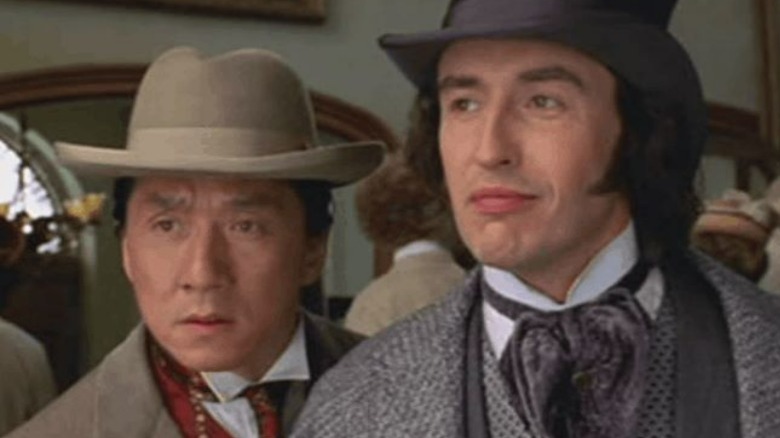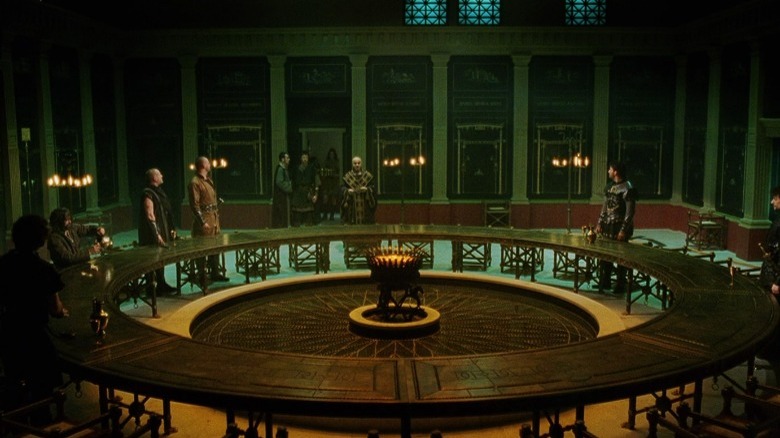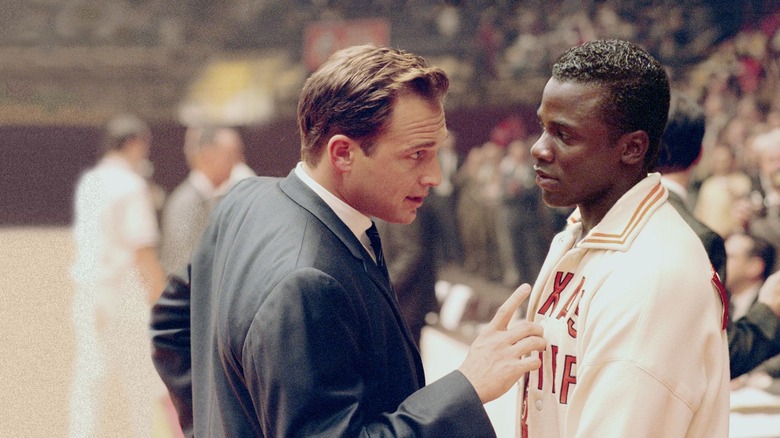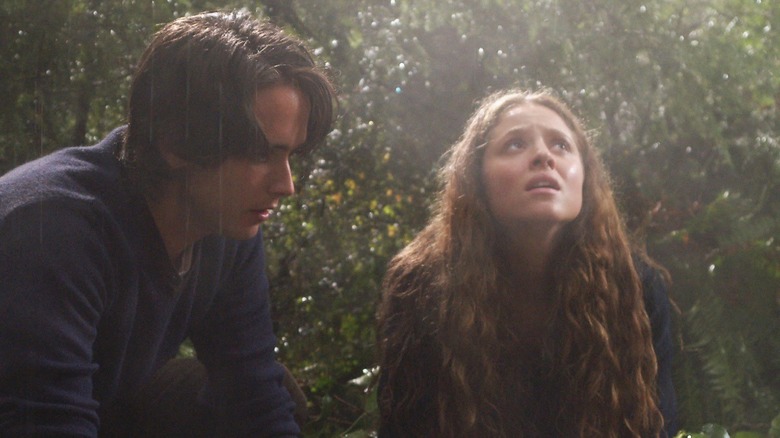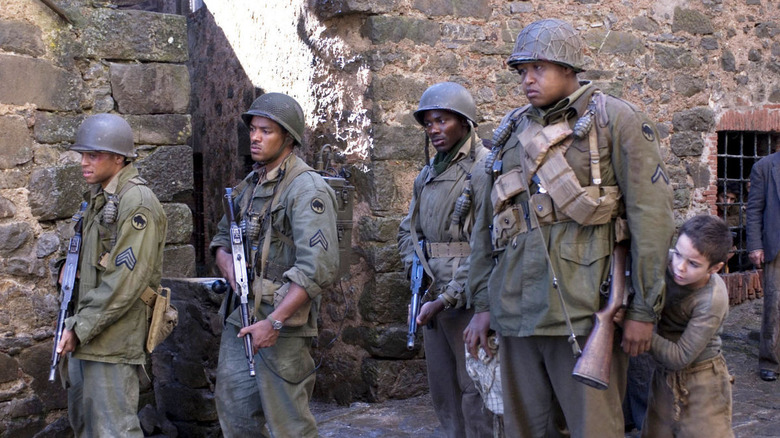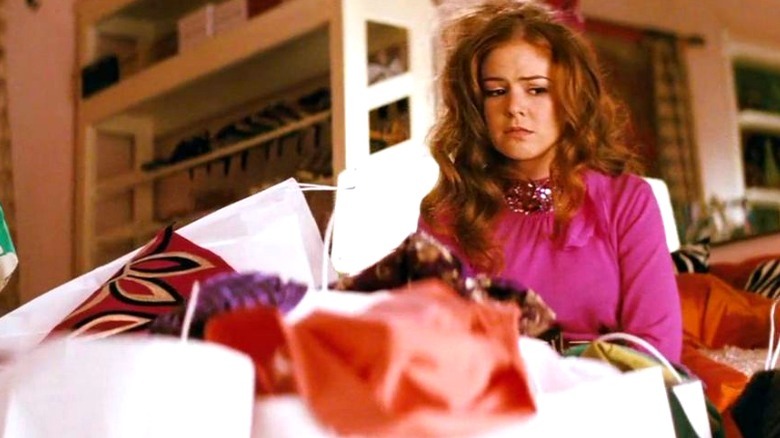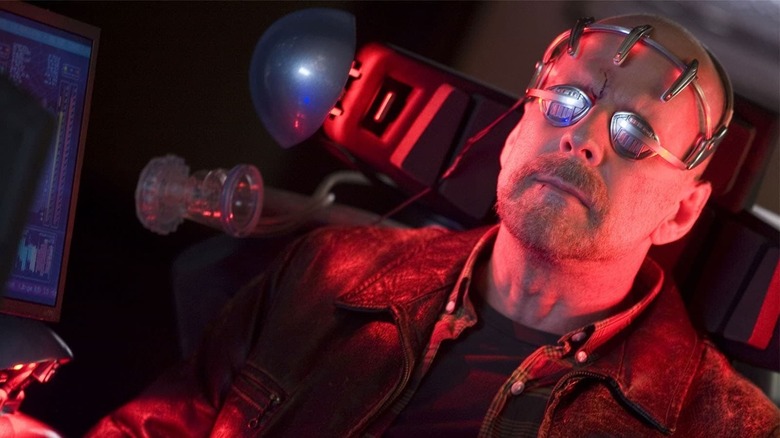The Real Reason These 2000s Disney Movies Flopped
The mid-2000s were a strange time for the Disney company. The Michael Eisner era was coming to a close, while relationships with key creatives like the artists at Pixar Animation Studios had never been more frayed. Once 2006 rolled around, Bob Iger was firmly planted as the new CEO of Disney, though even his tenure had initial growing pains. During this decade, the company also produced a massive amount of movies through its various film divisions, like Walt Disney Pictures, Touchstone Pictures, and Hollywood Pictures. The 2000s were no less peculiar for Disney at the box office than anything else about the company in this era. Hits like the first three "Pirates of the Caribbean" movies, "Signs," and "Finding Nemo" were around, but there were also lots of costly flops.
The biggest live-action Disney movie duds at the box office in the 2000s reflect many things, including which genres audiences weren't interested in at this point and what actors weren't major draws for moviegoers. In hindsight, many of these titles, particularly the lower-budget horror fare and R-rated action-comedies, reflect the kind of titles Disney would no longer release once the 2010s rolled around. The box office reliability of Marvel Studios and "Star Wars" movies removed any need for the likes of "Bad Company" and "Reign of Fire." These are just a few of the many takeaways from examining box office non-starters from one of Disney's most tumultuous decades — here are the company's biggest flops from the 2000s.
Mission to Mars
"Mission to Mars," a drama about a rescue mission to the red planet to retrieve a marooned astronaut, had no shortage of talent bringing it to life. Legendary filmmaker Brian de Palma directed while Ennio Morricone composed the score. The cast featured the likes of Gary Sinise and Don Cheadle, and the entire enterprise stemmed from a Disney theme park attraction of the same name. Sometimes, assembling so much talent for one movie results in a big hit. Other times, it turns out you can't throw enough names at the problem to cover up a dud. The latter scenario befell "Mission to Mars," which crashed and burned upon entry into the theatrical marketplace.
Costing $90 million to make, "Mission to Mars" only scored $106 million from global moviegoers. Intended to be the must-see movie event of early 2000, "Mission to Mars" got its thunder stolen by other, notably cheaper, movies that also opened in March, like "Erin Brockovich" and "Final Destination." It didn't help that the movie's premise lacked the sort of excitement and wonder that usually draws audiences to big-budget movies. "Mission to Mars" certainly wasn't lacking big-name talent, but none of those recognizable figures could help boost this title's dismal box office run.
Just Visiting
In 1990, with the horror-comedy "Arachnophobia," Hollywood Pictures launched as a new subdivision of Disney dedicated to producing adult-skewing fare (via Los Angeles Times). Over the years, Hollywood Pictures released several hits, including "The Sixth Sense," and built up positive long-term relationships with major figures like Jerry Bruckheimer. However, the studio also had its low points, like the 2001 comedy "Just Visiting." This wacky time-travel adventure concerned two French men (Jean Reno as Thibault and Christian Clavier as Andre) from the medieval era who wind up in then-modern day Chicago. Lots of comical misunderstandings ensue, as you might expect.
The high-concept zaniness of "Just Visiting" wasn't enough to make people turn out in droves to see this feature. "Just Visiting" only grossed $16.1 million worldwide, including a disastrous $4.7 million domestically. Part of the problem was the film's cast, which didn't feature any of the sorts of A-listers that anchor the biggest comedies. Christina Applegate, for instance, was a prominent fixture on promotional materials for "Just Visiting," but up to this point, she'd never appeared in a movie that cleared $40 million domestically.
It didn't help that "Just Visiting's" time travel premise felt out of step with what audiences wanted out of comedies in 2001. That year's biggest comedies were "American Pie 2," "Legally Blonde," and "Rush Hour 2," all of which were grounded in reality. All of these problems ensured that one of the last Hollywood Pictures releases was a total box office dud.
Bad Company
The world is in peril, and the only man that can save it is dead. Thankfully, he has a wacky twin (Chris Rock), who is recruited by a crusty CIA agent (Anthony Hopkins) to save the planet. The basic plotline of "Bad Company" is your average mismatched action-comedy duo in the vein of "48 Hrs." or "Tango and Cash." Many of these films had turned into big box office hits in the past, and it wasn't far-fetched that "Bad Company" could follow in their footsteps financially. It didn't hurt that Hopkins was fresh off headlining the massive box office hit "Hannibal," which grossed over $165 million domestically alone.
However, while audiences love seeing Hopkins as a sneaky cannibal speaking in eloquent riddles, it seems that they're less prone to show up when he's firing off a gun and quippy one-liners. For his part, Rock, at this juncture, didn't have a lot of experience being the leading man of massive box office hits. As a result, "Bad Company" unsurprisingly cratered at the box office, earning only $69.1 million worldwide on a $70 million budget.
Its theatrical run wasn't helped by how its plot, involving a potential terrorist attack, conjured up such strong reminders of 9/11 that it was delayed from its initial December 2001 release date (via Den of Geek). Even with a few extra months of breathing room, people still want escapism in their action films, not reminders of horrific tragedies, and moviegoers stayed away from "Bad Company."
Reign of Fire
In the modern world, a sizeable blockbuster starring Christian Bale and Matthew McConaughey would likely be a way bigger deal and possibly even be the must-see star-studded tentpole of a summer moviegoing season. However, things were quite different in 2002 when this pair of actors teamed up for "Reign of Fire," a movie about humans fighting back against dragons in a post-apocalyptic wasteland.
In 2002, Bale had yet to be cast as Batman and the only live-action movie he appeared in that had cleared $50 million was "Shaft." McConaughey at least had hits like "A Time to Kill" and "Contact" under his belt, but this was still before "How to Lose a Guy in 10 Days" would solidify him as a surefire leading man. In other words, they were a far cry from the versions of Bale and McConaughey we know today.
At this juncture of their careers, neither Bale nor McConaughey's presence was enough to get people to come out in droves to "Reign of Fire," despite the film promising to deliver a shot of McConaughey lunging at a dragon while clutching a spear. In its worldwide run, "Reign of Fire" made only $82.1 million, the majority of which came from a lackluster $43 million haul in North America. On a $60 million budget, "Reign of Fire" failed to make a profit and ended up being a far cry from the kind of hits its leading men would anchor in the years to come.
The Country Bears
In 2003, "Pirates of the Caribbean: The Curse of the Black Pearl" became a mammoth hit and birthed a new long-term franchise for Walt Disney Pictures. Based on the "Pirates of the Caribbean" theme park attraction, the film proved that rides at Disneyland could spawn movies that took on a life of their own. A whole year before Jack Sparrow swung into movie theaters, though, another feature debuted, one that showed that Disney theme park rides could just as easily spawn box office duds as they could moneymakers. That earlier film was "The Country Bears," which tried to turn the Disney World attraction Country Bear Jamboree into a new hit family feature. In terms of box office, the results of these ambitions were downright grisly.
Even though it cost only $20 million to make, "The Country Bears" was still a massive disappointment financially and grossed just $16.9 million domestically. Overall, 2002 was a year of disappointments for Disney, but "The Country Bears" still made less than notable box office misses such as "Treasure Planet" and "Tuck Everlasting." Talking to "The Look Back Machine" podcast, "The Country Bears" director Peter Hastings noted that everything about the film, especially its poster and title, alienated adult viewers. The lack of all-ages appeal sealed its doom — although it certainly didn't help that the film opened one week after "Stuart Little 2."
The Alamo
Remember the Alamo? If you were a prospective moviegoer in April 2004, Walt Disney Pictures certainly hoped you did. The studio had a lot of money on the line for its Touchstone Pictures epic "The Alamo," which retold the famous Texas historical event with actors like Billy Bob Thornton and Dennis Quaid. Opting for such a straightforward PG-13 retelling of the battle of the Alamo was already a bad enough idea to jeopardize the box office prospects of "The Alamo." People were already familiar with this event and would need more than just a traditional retelling of it to get them into a movie theater.
It didn't help that while Thornton and Quaid had anchored critically acclaimed movies in the past, they weren't massive forces at the box office in 2004. With no huge names in its cast or an especially unique hook to lean its marketing on, nobody expected "The Alamo" to be huge. Still, few could've imagined just how bad it would wipe out at the box office. Moviegoers thoroughly rejected this $92 million budgeted title, as evidenced by its dismal $23.9 million worldwide gross. A sizeable money-loser, "The Alamo" just didn't stir up much interest from moviegoers despite being based on one of the most recognizable American historical events out there.
Around the World in 80 Days
In 2004, the classic novel "Around the World in 80 Days" got a modern-day Disney update. Starring Steve Coogan and Jackie Chan, "Around the World in 80 Days" arrived in theaters with a massive $110 million budget. That was a hefty cost for a live-action family movie, especially one that wasn't based on source material that was super relevant to kids in the early 2000s. It would've taken a miracle for "Around the World in 80 Days" to recoup its cost. It never got that miracle. On the contrary, its worldwide box office run was nothing short of a disaster.
This feature only grossed $72 million worldwide, which included a dismal $24 million in the U.S. That meager sum ensured that the expensive "Around the World in 80 Days" made less in North America than significantly cheaper Disney fare from 2004, such as "Raising Helen" or "Confessions of a Teenage Drama Queen." Meanwhile, "Around the World in 80 Days" also made noticeably less domestically than many other Jackie Chan vehicles from this era, including titles like "The Tuxedo."
While lots of problems plagued this movie's box office run, this adaptation was especially hurt by opening so close to the release of kid-friendly box office juggernauts like "Shrek 2" and "Harry Potter and the Prisoner of Azkaban." Whatever the reason for its financial woes, the global box office run of "Around the World in 80 Days" was a bomb no matter how you sliced it.
King Arthur
No matter what Hollywood does, North American audiences just do not seem to care about King Arthur or any associated Arthurian legends. Whether it's a family-friendly musical like "Quest for Camelot" or a big-budget blockbuster like "King Arthur: Legend of the Sword," the world of King Arthur is just not something that brings in big box office. The year 2004 saw an especially good example of this phenomenon with the aptly titled "King Arthur." Starring Clive Owen, Mads Mikkelsen, and Keira Knightley, director Antoine Fuqua wanted to have "King Arthur" retell the classic Arthurian legends with a dash of grimy realism.
Going this route didn't do anything to break up the box office curse that's plagued so many King Arthur adaptations. While not an absolute disaster, the feature still made only $203 million worldwide on a $90 million budget, including an abysmal $51.8 million domestically. The film's box office run, especially in North America, was impacted adversely by opening just one week after box office juggernaut "Spider-Man 2" and a week before "I, Robot." The odds were already stacked against "King Arthur," but opening it in between Spidey and Will Smith sealed its doom. Clive Owen having minimal experience headlining big box office hits up to that point didn't help matters.
King Arthur movies don't have a good modern box office track record, but that was just the tip of the iceberg of the problems "King Arthur" faced at the box office in its 2004 theatrical release.
Glory Road
In the 2000s, Disney hit upon a formula for box office hits with "Remember the Titans." Grossing $136 million worldwide on a $30 million budget, "Remember the Titans" established that Disney could make a lot of money with modestly-budgeted inspirational sports movies anchored by a recognizable name. In the years that followed, Disney attempted to make the "Remember the Titans" lightning strike twice with further projects like "The Rookie" or "Miracle." An especially misguided attempt to follow this formula came in 2006 with "Glory Road," a basketball drama set in Texas that starred Josh Lucas.
In its global box office run, "Glory Road" only grossed $42.7 million on a $30 million budget. "Glory Road" wasn't just down from the box office highs of "Remember the Titans," it also made noticeably less than "Miracle" two years earlier. There are a couple of issues at play that kept "Glory Road" from being a box office hit, but its lack of a huge leading man was an especially big factor. Other Disney sports movies had been anchored by recognizable leading men like Denzel Washington and Kurt Russell. By contrast, "Glory Road" was headlined by Josh Lucas, who was coming off the mammoth 2005 box office bomb "Stealth."
Without a recognizable lead actor to draw in audiences, "Glory Road" was already on an uphill climb to profitability. Having to share family audiences with "Hoodwinked" over its opening weekend was another of several problems that tripped up "Glory Road."
The Invisible
Rarely do studios get to go out on their terms. The financial losses that can sink a movie studio are often so sudden and unexpected that nobody can predict what will end up being the final feature released by one of these outfits. Could anyone have imagined that the saga of the legendary United Artists would conclude with "Heaven's Gate" or that "Semi-Pro" would be the last independent New Line Cinema release? Similarly, who could've predicted that "The Invisible" would conclude the nearly 20-year run of the Disney movie division Hollywood Pictures? This final feature concerned a high school student (Justin Chatwin) who wakes up one day to find that he's turned invisible. The story then follows him uncovering the disturbing secrets behind his condition.
Directed by David S. Goyer, "The Invisible" grossed just $23.5 million worldwide, the vast majority of that coming from its $20.5 million domestic run. While there are several reasons "The Invisible" was ignored by general moviegoers, it was especially hurt by opening so close to fellow April 2007 new release "Disturbia." That box office hit was the go-to thriller for teen audiences that month, "The Invisible" had no chance of competing. With this last film, Hollywood Pictures went out with a box office whimper.
Miracle at St. Anna
Spike Lee joints like "Do the Right Thing" or "BlacKkKlansman" may not be the first thing to pop into your head when you think of Disney movies, but for a while there, Lee was regularly making hefty dramas for Disney's Touchstone Pictures division. The likes of "25th Hour" and "He Got Game" were all released by this section of the Walt Disney Company. The final Lee directorial effort to get released by the Mouse House was "Miracle at St. Anna." The film told the story of a quartet of World War II soldiers (played by Derek Luke, Michael Ealy, Laz Alonso, and Omar Benson Miller) who end up stuck in enemy territory and have to find refuge in a Tuscany village.
There was a lot of dramatic potential in such a premise, particularly when it was being handled by a filmmaker as acclaimed as Spike Lee. Unfortunately, "Miracle at St. Anna" scored widely negative reviews from critics, the kiss of death for the box office potential for any adult drama trying to open during award season. Without a flood of positive buzz to make it stand out in a crowded marketplace, "Miracle at St. Anna" only grossed $9.6 million worldwide on a $40 million budget. That put "Miracle at St. Anna" below the global grosses of much earlier Spike Lee films, such as "Clockers" and "Crooklyn." After this box office non-starter, Lee and Disney went their separate ways.
Confessions of a Shopaholic
In another era, perhaps "Confessions of a Shopaholic" would have hit a bullseye in appealing to the interests of general moviegoers. This adaptation of the book series "Shopaholic" by Sophie Kinsella, the film follows Becky Bloomwood (Isla Fisher), who serves as the film's titular shopaholic. Her life seems to be turning around once she takes off as an advice columnist, but her compulsive shopping habits seem poised to ruin everything. It's not a terrible premise for a cutesy romantic comedy, particularly since it snagged Isla Fisher and Hugh Dancy in the lead roles. Unfortunately, "Shopaholic" came out in February 2009, less than a year after The Great Recession officially began.
General moviegoers were now scrimping by, counting pennies, and more aware than ever of the value of a dollar. In early 2009, hits like "Paul Blart: Mall Cop" or "Taken" took off while focusing on underdog working-class protagonists. In the same period, though, "Confessions of a Shopaholic" struggled to attract moviegoers with a lead character who could afford enough lavish items to be a "shopaholic." The film also had trouble getting the attention of romantic-comedy moviegoers away from the sleeper hit "He's Just Not That Into You." With $108 million worldwide, including a meager $44.2 million North American sum, "Confessions of a Shopaholic" suffered greatly, in so many different ways, by being the wrong movie at the wrong time.
Surrogates
At the end of the 2000s, Bruce Willis was in a bit of a box office slump. While "Live Free or Die Hard" had been a hit, his other leading man projects in this era, like "Perfect Stranger" or "16 Blocks," failed to connect with moviegoers. Part of this downward trend was "Surrogates," a film released in the final days of Touchstone Pictures. This sci-fi thriller saw Willis playing a detective in a world where everyone uses robotic avatars to walk around and live their everyday lives. When one of these automatons is killed, the film's protagonist begins a murder investigation that could unravel a larger conspiracy.
In its basic plot, "Surrogates" didn't offer a whole lot that was new to general moviegoers. Its story about robots going violently wrong evoked "I, Robot" rather than a fresh film you have to see on the big screen. Combine that with Willis not being an automatic draw for the general public in 2009, and the eventual box office struggles of "Surrogates" were far from surprising. On an $80 million budget, "Surrogates" made only $119.6 million worldwide, with a paltry $38.5 million coming from domestic theaters. Bruce Willis has headlined a lot of iconic box office sensations. Unfortunately for the film's financiers, "Surrogates" was not one of them.
